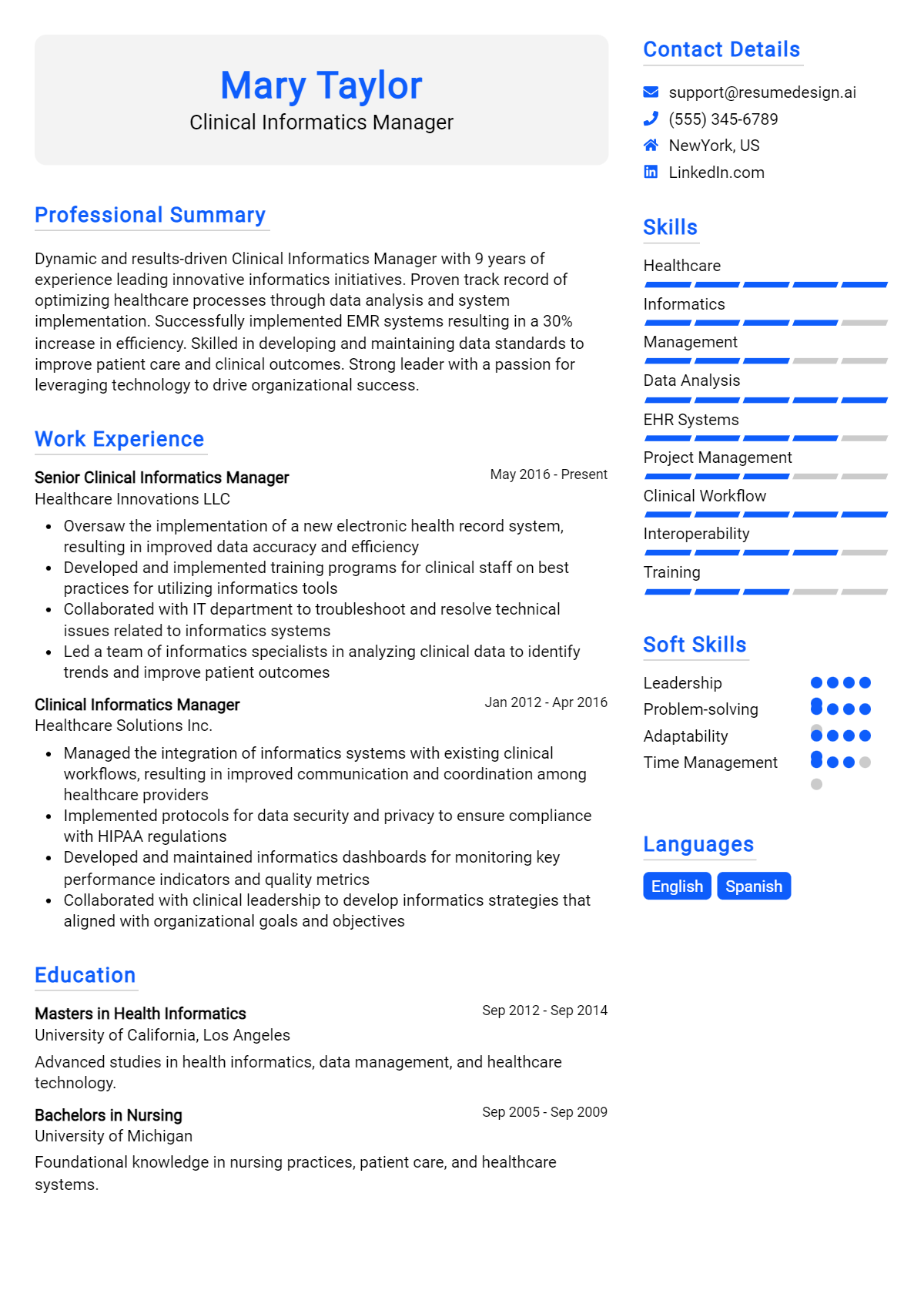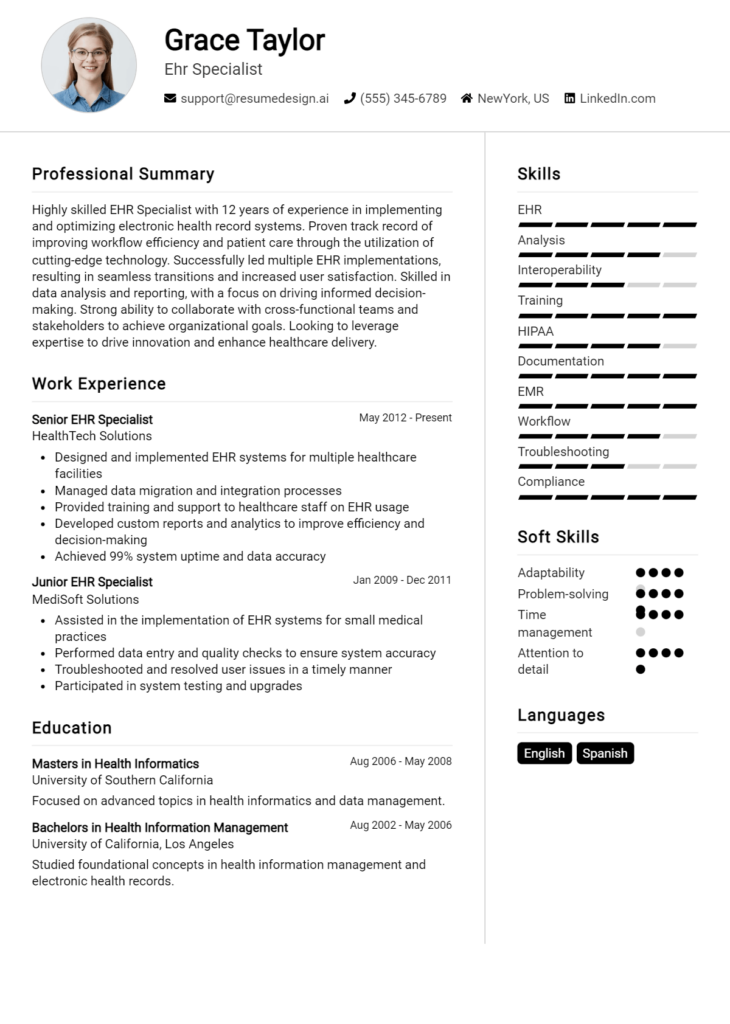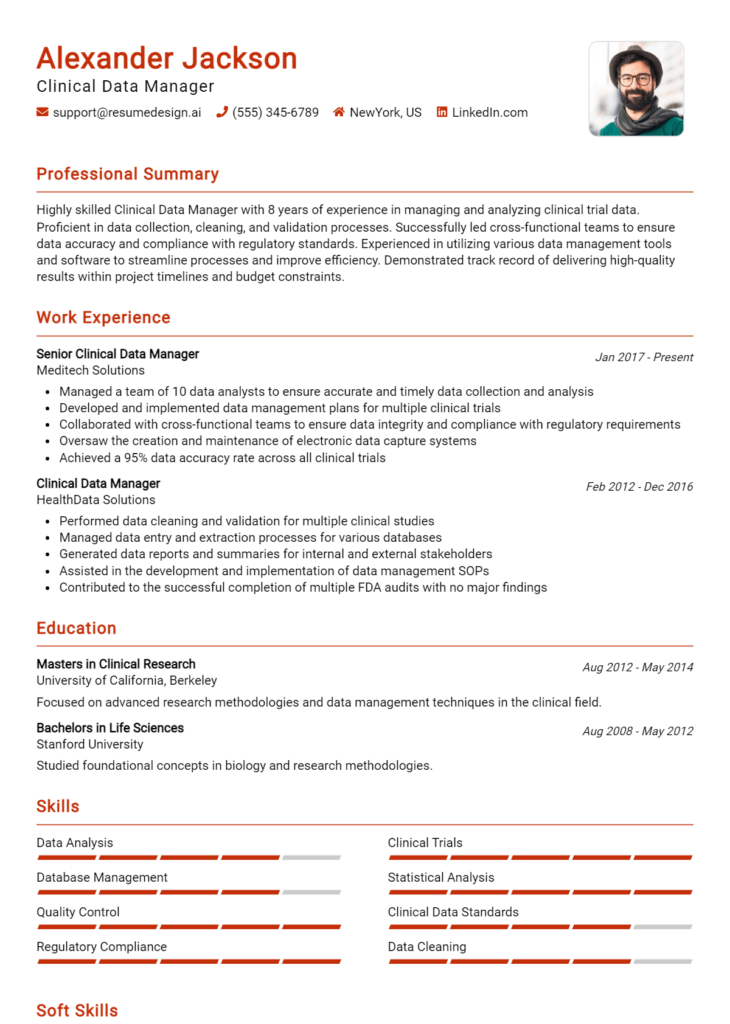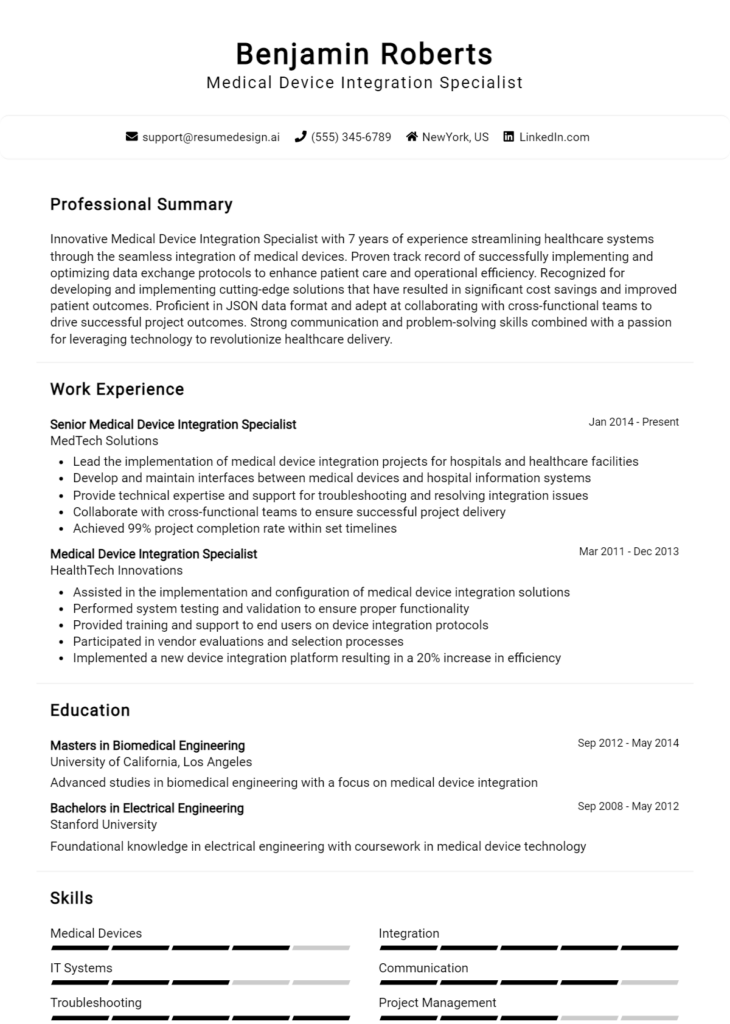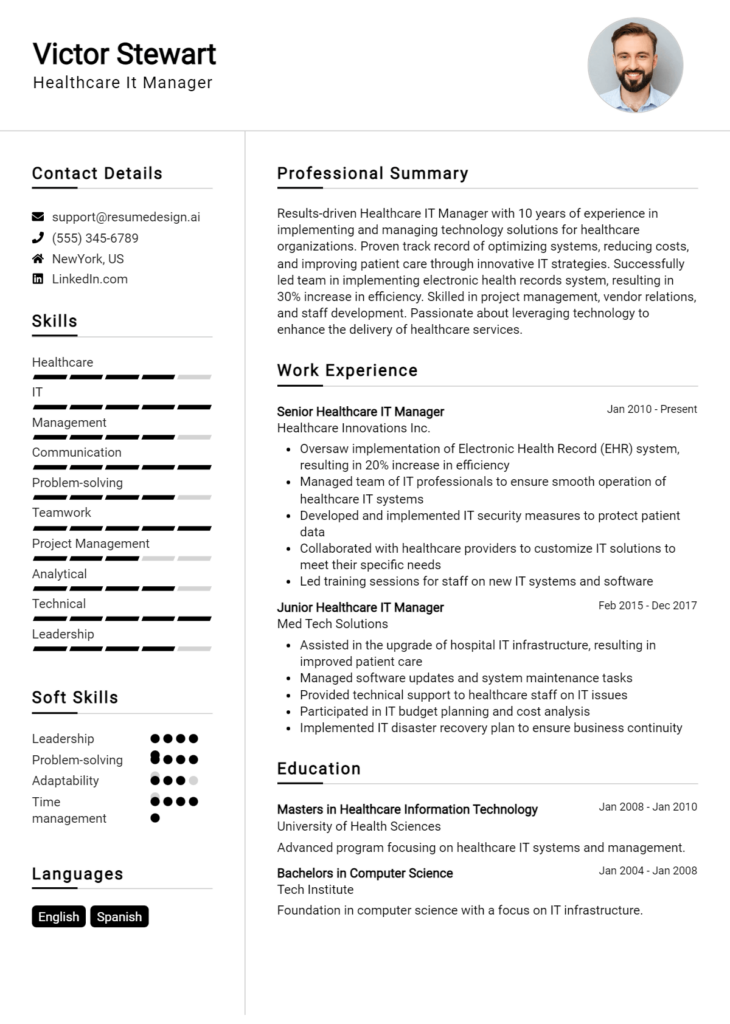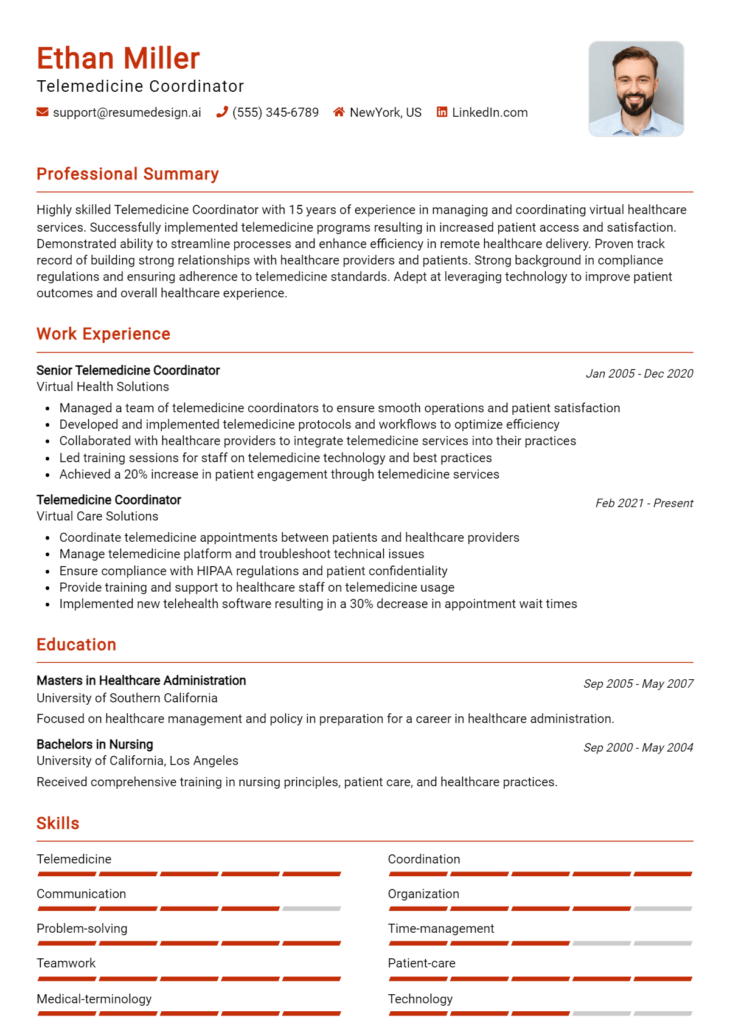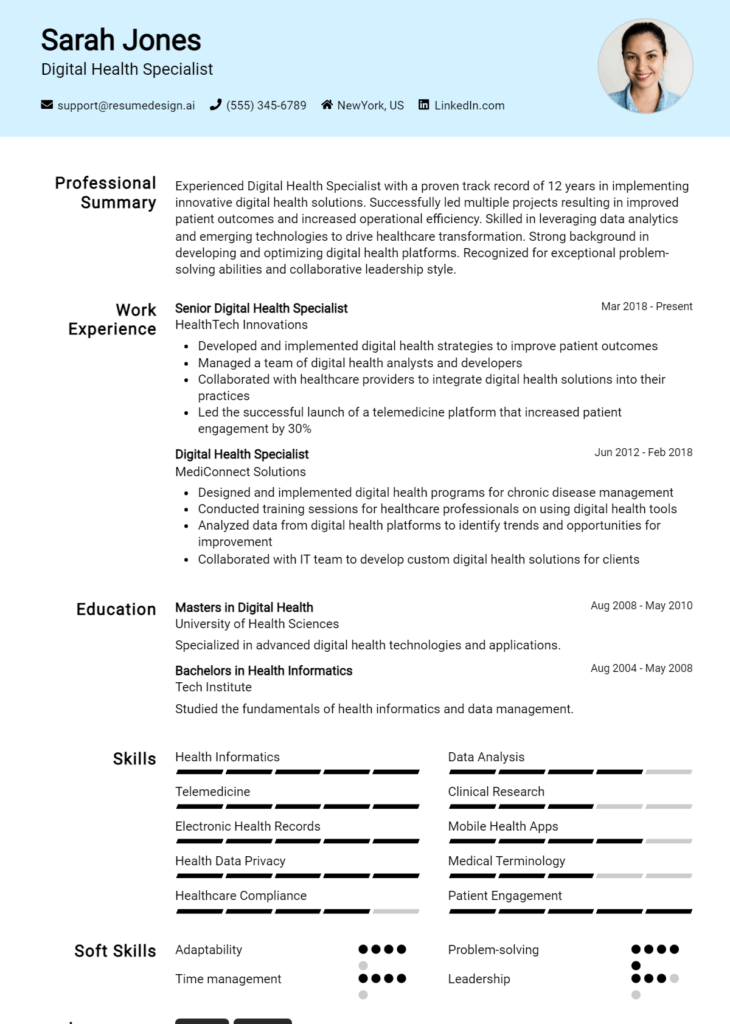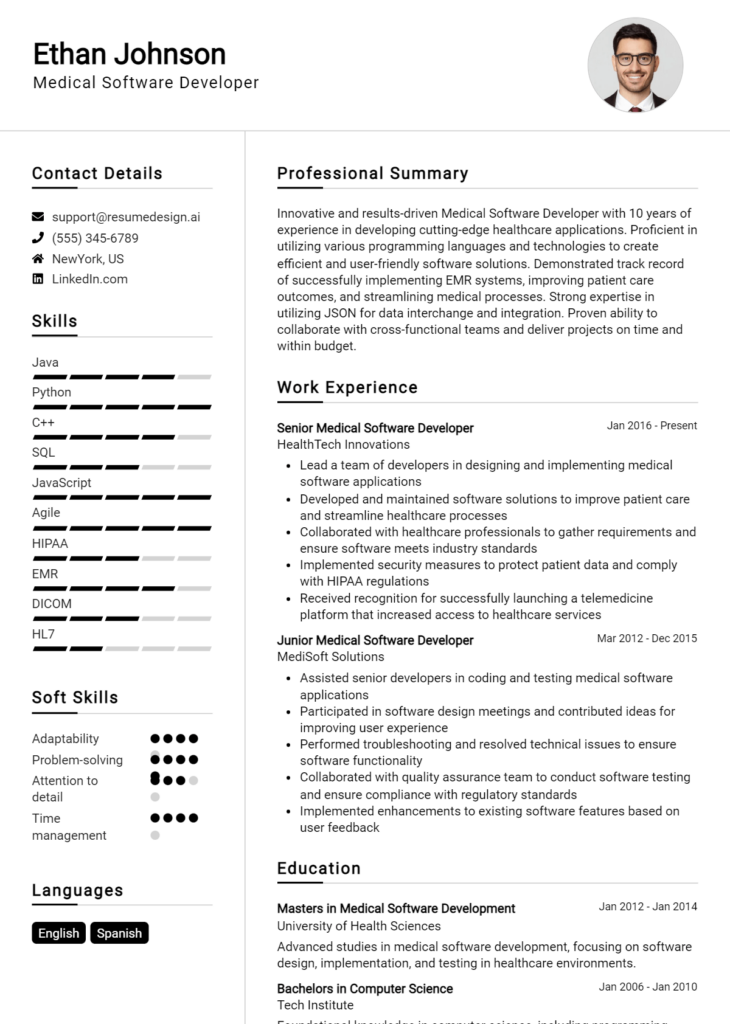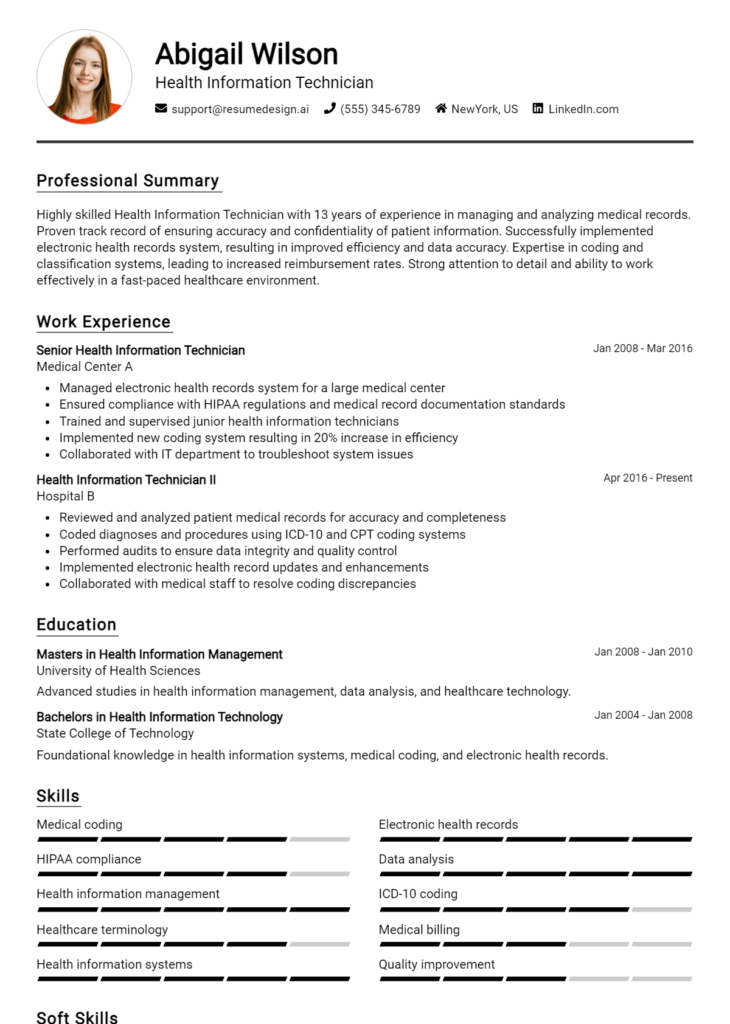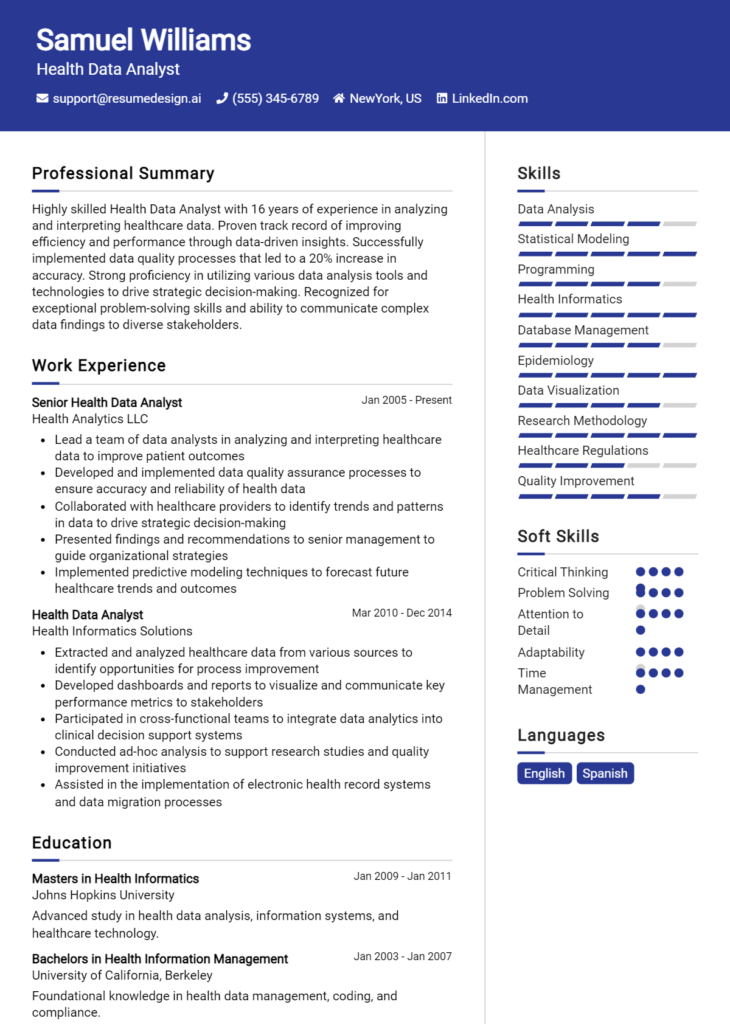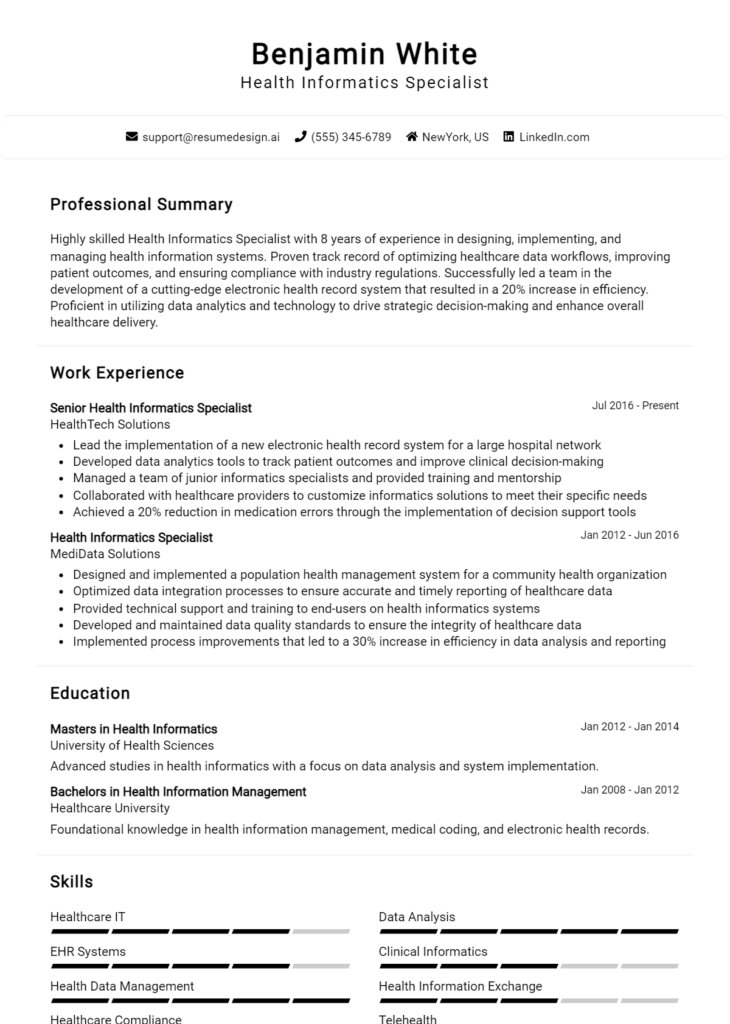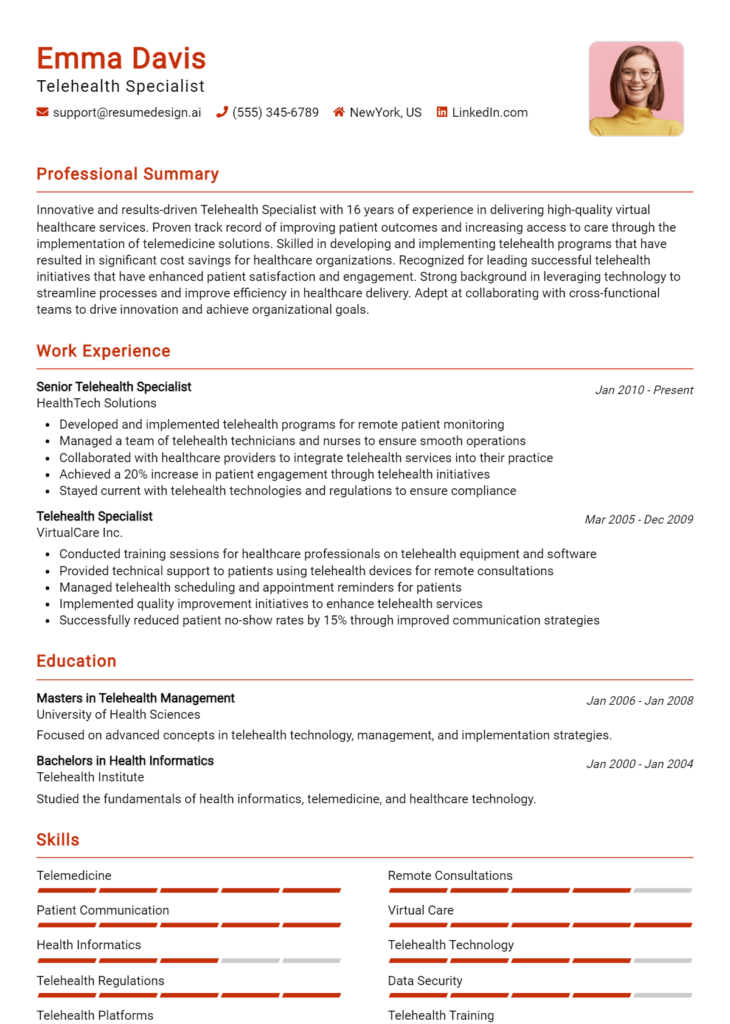Clinical Informatics Manager Core Responsibilities
A Clinical Informatics Manager plays a crucial role in bridging the gap between clinical operations and information technology. This professional is responsible for managing health information systems, ensuring data integrity, and enhancing clinical workflows through technology integration. Essential skills include technical proficiency, operational insight, and strong problem-solving abilities, all of which are vital for optimizing healthcare delivery and improving patient outcomes. A well-structured resume can effectively showcase these qualifications, demonstrating the candidate's alignment with organizational goals.
Common Responsibilities Listed on Clinical Informatics Manager Resume
- Oversee the implementation and optimization of electronic health record (EHR) systems.
- Collaborate with clinical staff to identify and resolve informatics-related issues.
- Analyze healthcare data to support decision-making and improve patient care.
- Develop and maintain clinical informatics policies and procedures.
- Train healthcare professionals on informatics tools and best practices.
- Ensure compliance with regulatory standards and data security measures.
- Facilitate interdisciplinary communication to enhance workflow efficiency.
- Lead projects aimed at integrating new technologies in clinical settings.
- Monitor and evaluate the performance of clinical information systems.
- Support research initiatives through data management and analysis.
- Engage in continuous education to stay updated on informatics trends and innovations.
High-Level Resume Tips for Clinical Informatics Manager Professionals
In the competitive field of clinical informatics, a well-crafted resume is essential for professionals seeking to make a strong first impression on potential employers. As the initial touchpoint between candidates and hiring managers, a resume must effectively showcase not only the applicant's skills but also their accomplishments and contributions to the field. For Clinical Informatics Managers, this document serves not just as a summary of work history but as a powerful marketing tool that reflects expertise in managing healthcare data systems, improving patient care through technology, and driving organizational efficiencies. This guide will provide practical and actionable resume tips specifically tailored for Clinical Informatics Manager professionals, ensuring you present yourself in the best possible light.
Top Resume Tips for Clinical Informatics Manager Professionals
- Tailor your resume to the job description by incorporating keywords and phrases from the posting.
- Highlight relevant experience in clinical informatics, such as project management, data analysis, and system implementation.
- Quantify your achievements with specific metrics, such as percentage improvements in patient outcomes or reductions in data processing time.
- Showcase industry-specific skills, including knowledge of EHR systems, data governance, and interoperability standards.
- Include certifications pertinent to clinical informatics, such as Certified Professional in Healthcare Information and Management Systems (CPHIMS) or Clinical Informatics Board Certification.
- Utilize action verbs and clear language to convey your responsibilities and achievements effectively.
- Incorporate a professional summary at the top of your resume that encapsulates your experience and what you bring to the role.
- Keep your resume format clean and professional, making it easy for hiring managers to navigate through your qualifications.
- Limit your resume to one or two pages, ensuring that only the most relevant and impactful information is included.
By implementing these tips, Clinical Informatics Manager professionals can significantly enhance their resumes, increasing their chances of standing out to hiring managers and landing coveted positions in the field. A well-structured and targeted resume not only showcases your qualifications but also demonstrates your commitment to the profession and readiness to contribute to the evolving landscape of clinical informatics.
Why Resume Headlines & Titles are Important for Clinical Informatics Manager
In the competitive field of healthcare technology, a Clinical Informatics Manager plays a pivotal role in optimizing the use of data and technology to improve patient outcomes and healthcare operations. As such, a well-crafted resume headline or title is essential in capturing the attention of hiring managers at a glance. A strong headline not only summarizes a candidate's key qualifications and expertise in a concise manner but also sets the tone for the rest of the resume. By being relevant and directly related to the job being applied for, the headline serves as an impactful introduction that can differentiate a candidate from others in the applicant pool.
Best Practices for Crafting Resume Headlines for Clinical Informatics Manager
- Be concise: Aim for a headline that is brief yet informative, ideally no longer than a single phrase.
- Use role-specific language: Incorporate industry terminology and keywords that are relevant to clinical informatics.
- Highlight key qualifications: Focus on your most significant skills or accomplishments that align with the job description.
- Showcase leadership qualities: If applicable, emphasize any managerial or leadership roles you have held.
- Align with the job title: Make sure your headline reflects the specific position you are applying for.
- Avoid jargon: While terminology is important, ensure that your headline is easily understood by a broad audience.
- Make it impactful: Use powerful adjectives or phrases that convey your expertise and value proposition.
- Customize for each application: Tailor your headline to fit each specific job application for maximum relevance.
Example Resume Headlines for Clinical Informatics Manager
Strong Resume Headlines
Transformational Clinical Informatics Manager with 10+ Years of Experience in Data-Driven Healthcare Solutions
Innovative Healthcare Technology Leader | Expert in EHR Implementation and Optimization
Strategic Clinical Informatics Expert | Proven Record of Enhancing Patient Care Through Technology
Weak Resume Headlines
Manager Looking for a Job
Experienced Professional in Healthcare
The strong headlines are effective because they immediately convey a clear sense of the candidate's qualifications, experience, and value proposition in a compelling manner. They utilize specific terminology and metrics that resonate with hiring managers in the healthcare sector, effectively communicating what makes the candidate an ideal fit for the role. Conversely, the weak headlines fail to impress because they lack specificity and do not provide any insight into the candidate’s unique skills or contributions, making them forgettable and generic in a crowded job market.
Writing an Exceptional Clinical Informatics Manager Resume Summary
A well-crafted resume summary is vital for a Clinical Informatics Manager as it serves as a quick introduction to the candidate’s qualifications, helping to capture the attention of hiring managers. In today's competitive job market, hiring managers often sift through numerous applications, and a strong summary succinctly highlights key skills, relevant experience, and notable accomplishments that align with the job role. This critical section should be concise, impactful, and tailored to the specific job being applied for, ensuring that it resonates with the employer's needs and demonstrates the candidate's value right from the start.
Best Practices for Writing a Clinical Informatics Manager Resume Summary
- Quantify achievements to demonstrate impact (e.g., "increased data efficiency by 30%").
- Highlight specific skills relevant to clinical informatics, such as EHR implementation or data analytics.
- Tailor the summary to match keywords and requirements from the job description.
- Use action verbs to convey a sense of leadership and initiative.
- Keep the summary concise, ideally no more than 3-4 sentences.
- Showcase your understanding of healthcare regulations and standards.
- Include any relevant certifications or advanced degrees to enhance credibility.
- Focus on both technical skills and soft skills, such as communication and teamwork.
Example Clinical Informatics Manager Resume Summaries
Strong Resume Summaries
Dynamic Clinical Informatics Manager with over 10 years of experience leading EHR implementations that improved documentation accuracy by 40%. Proven track record in data analysis and clinical decision support, leveraging advanced analytics to enhance patient outcomes in a multi-disciplinary team environment.
Results-oriented Clinical Informatics professional with a Master's in Health Informatics and 8 years of experience in optimizing clinical workflows. Successfully managed a team that developed a data-driven solution which reduced patient admission times by 25%, enhancing overall patient satisfaction.
Dedicated Clinical Informatics Manager with expertise in health IT project management and regulatory compliance. Spearheaded the transition to a new EMR system, resulting in a 50% decrease in documentation errors and a 20% increase in clinician satisfaction scores within the first year.
Weak Resume Summaries
Experienced healthcare professional looking for a position in clinical informatics.
Clinical Informatics Manager with some skills in data management and EHR systems.
The strong resume summaries are considered effective because they include specific metrics, showcase relevant skills, and directly relate to the responsibilities of a Clinical Informatics Manager. They provide concrete examples of achievements and a clear understanding of the role's demands. Conversely, the weak summaries lack detail, fail to demonstrate quantifiable outcomes, and do not convey the candidate's unique value or relevance to the position, making them less compelling to hiring managers.
Work Experience Section for Clinical Informatics Manager Resume
The work experience section of a Clinical Informatics Manager resume is crucial as it provides a comprehensive overview of a candidate's professional journey and expertise in the field. This section not only highlights the technical skills that are essential for managing health informatics systems but also showcases the candidate's ability to lead teams, implement innovative solutions, and deliver high-quality products within the healthcare environment. By quantifying achievements—such as improved patient outcomes or system efficiencies—and aligning experiences with industry standards, candidates can effectively demonstrate their value to potential employers.
Best Practices for Clinical Informatics Manager Work Experience
- Clearly articulate technical skills relevant to clinical informatics, including software proficiency and data analytics capabilities.
- Use metrics to quantify accomplishments, such as percentage improvements, budget savings, or time reductions in project delivery.
- Highlight leadership roles and team management experiences to demonstrate your capability in guiding diverse teams.
- Showcase collaborative projects that involved cross-functional teamwork, emphasizing your ability to work with clinicians, IT professionals, and stakeholders.
- Align your experiences with industry standards and regulations, such as HIPAA compliance or interoperability frameworks.
- Utilize action verbs to convey a sense of proactivity and impact in your roles.
- Customize your work experience to match the job description of the position you are applying for, emphasizing relevant experiences.
- Keep descriptions concise yet informative, ensuring clarity and readability.
Example Work Experiences for Clinical Informatics Manager
Strong Experiences
- Led a team of 10 in the implementation of an electronic health record (EHR) system, resulting in a 30% reduction in patient documentation errors within the first quarter.
- Developed and executed a data analytics strategy that improved patient engagement metrics by 25%, enhancing overall patient satisfaction scores.
- Collaborated with multidisciplinary teams to optimize workflow processes, achieving a 15% increase in operational efficiency across various departments.
- Managed a $500,000 budget for clinical informatics projects, successfully delivering all initiatives under budget while meeting project milestones.
Weak Experiences
- Worked on various informatics projects without detailing specific outcomes or roles.
- Assisted in team meetings and contributed ideas without mentioning any tangible results from those contributions.
- Involved in system upgrades, but did not specify the impact on daily operations or user experience.
- Participated in training sessions for staff without stating how this training improved their productivity or system usage.
The examples of strong experiences are considered effective due to their focus on quantifiable outcomes, clear leadership roles, and collaborative efforts that align with the responsibilities of a Clinical Informatics Manager. In contrast, the weak experiences lack specificity, measurable achievements, and fail to demonstrate the candidate's impact within their roles, making them less compelling to prospective employers.
Education and Certifications Section for Clinical Informatics Manager Resume
The education and certifications section of a Clinical Informatics Manager resume is crucial as it underscores the candidate's academic foundation and commitment to the field. This section not only showcases relevant degrees but also highlights industry-recognized certifications and ongoing professional development efforts. By providing pertinent coursework, specialized training, and certifications, candidates can significantly enhance their credibility and demonstrate their alignment with the job requirements. This information serves as a testament to their expertise and readiness to tackle the challenges within clinical informatics.
Best Practices for Clinical Informatics Manager Education and Certifications
- Prioritize degrees in healthcare, information technology, or related fields.
- Include industry-recognized certifications such as Certified Clinical Informaticist (CCIP) or Health Informatics Certification (HIC).
- List relevant coursework that directly pertains to clinical informatics and data management.
- Highlight any specialized training or workshops attended that enhance skills pertinent to the role.
- Ensure that all educational entries are up-to-date and reflect the latest credentials.
- Be specific about the institution and year of graduation or certification achievement.
- Consider including honors or recognitions received during academic or professional training.
- Keep the section concise yet informative, focusing on relevance to the job position.
Example Education and Certifications for Clinical Informatics Manager
Strong Examples
- M.S. in Health Informatics, University of XYZ, 2020
- Certified Clinical Informaticist (CCIP), 2021
- Advanced Data Analytics for Healthcare Professionals, Coursera, 2022
- B.S. in Nursing, University of ABC, 2015
Weak Examples
- Diploma in Computer Programming, 1998
- Certification in Basic First Aid, 2019
- B.A. in History, University of DEF, 2010
- Online course in Microsoft Excel, 2021
The strong examples are considered relevant and valuable because they reflect advanced degrees and certifications that align directly with the responsibilities of a Clinical Informatics Manager. They demonstrate a clear commitment to the field and the necessary technical skills. In contrast, the weak examples are deemed irrelevant or outdated, as they do not pertain to clinical informatics or fail to provide the advanced knowledge required for the role. This highlights the importance of choosing educational qualifications and certifications that are pertinent and current in the industry.
Top Skills & Keywords for Clinical Informatics Manager Resume
In the rapidly evolving field of healthcare, the role of a Clinical Informatics Manager is critical to bridging the gap between clinical practice and information technology. A well-crafted resume that highlights pertinent skills is essential for standing out in a competitive job market. Employers look for candidates who not only possess technical expertise but also demonstrate strong interpersonal abilities. By showcasing both hard and soft skills effectively, you can illustrate your capability to lead teams, manage projects, and drive improvements in healthcare delivery systems. For more information on how to enhance your resume with the right skills and work experience, continue reading.
Top Hard & Soft Skills for Clinical Informatics Manager
Soft Skills
- Strong Communication Skills
- Leadership and Team Management
- Critical Thinking and Problem Solving
- Adaptability and Flexibility
- Attention to Detail
- Collaboration and Teamwork
- Empathy and Patient-Centric Mindset
- Conflict Resolution
- Time Management
- Project Management
Hard Skills
- Health Informatics Knowledge
- Electronic Health Records (EHR) Management
- Data Analysis and Interpretation
- Clinical Workflow Optimization
- Healthcare Data Standards (HL7, FHIR)
- Regulatory Compliance (HIPAA, HITECH)
- Database Management Systems (DBMS)
- Programming Languages (SQL, Python)
- Systems Integration
- Project Management Software (e.g., JIRA, Asana)
Stand Out with a Winning Clinical Informatics Manager Cover Letter
I am writing to express my interest in the Clinical Informatics Manager position at [Company Name], as advertised on [Where You Found the Job Listing]. With a robust background in healthcare informatics, coupled with a passion for leveraging technology to improve patient care, I am excited about the opportunity to contribute to your team. My experience in managing clinical data systems and optimizing healthcare workflows aligns well with the goals of [Company Name], and I am eager to apply my skills to enhance the quality of care you provide.
In my previous role at [Previous Company Name], I successfully led a team in implementing an electronic health record (EHR) system that streamlined patient data management and improved clinical outcomes. By collaborating closely with physicians, nurses, and IT professionals, I was able to identify key areas for improvement and develop targeted strategies that resulted in a 30% increase in staff efficiency. My ability to communicate complex informatics concepts in a clear and actionable manner has been instrumental in gaining buy-in from diverse stakeholders and ensuring successful project deployment.
I am particularly drawn to [Company Name] because of your commitment to innovation in healthcare technology and your focus on data-driven decision-making. I believe that my expertise in data analytics, coupled with my experience in clinical settings, positions me uniquely to contribute to your initiatives aimed at enhancing patient care and operational efficiency. I am excited about the prospect of collaborating with your talented team to harness the power of informatics in transforming healthcare delivery.
Thank you for considering my application. I look forward to the opportunity to discuss how my skills and experiences align with the needs of [Company Name]. I am enthusiastic about the potential to make a meaningful impact as your Clinical Informatics Manager and am eager to contribute to your mission of providing high-quality healthcare.
Common Mistakes to Avoid in a Clinical Informatics Manager Resume
When crafting a resume for a Clinical Informatics Manager position, it's crucial to highlight your specialized skills and experience effectively. However, many candidates make common mistakes that can undermine their qualifications and reduce their chances of landing an interview. Avoiding these pitfalls can enhance your resume's impact and ensure it resonates with hiring managers in the healthcare and informatics sectors. Here are some prevalent mistakes to steer clear of:
Vague Job Descriptions: Failing to provide specific examples of past roles can leave hiring managers uncertain about your actual experience. Use concrete metrics and outcomes to illustrate your contributions.
Ignoring Keywords: Many organizations use applicant tracking systems (ATS) to filter resumes. Not incorporating relevant keywords from the job description can result in your resume being overlooked, even if you are qualified.
Overemphasizing Technical Skills: While technical expertise is essential in informatics, focusing too heavily on these skills can overshadow your leadership and management capabilities. Balance your technical and soft skills to present a well-rounded profile.
Lack of Tailoring: Sending out a generic resume to multiple employers can be detrimental. Customize your resume for each job application to reflect the specific requirements and culture of the organization.
Neglecting Professional Development: Failing to include ongoing education, certifications, or training pertinent to clinical informatics can make your resume appear stagnant. Highlight any recent courses or certifications to demonstrate your commitment to professional growth.
Poor Formatting: A cluttered or unprofessional layout can detract from the content of your resume. Use clear headings, bullet points, and a clean design to enhance readability and present a polished image.
Omitting Soft Skills: Many clinical informatics roles require strong interpersonal and communication skills. Neglecting to highlight these qualities may lead to a perception that you are solely a technical expert without the ability to collaborate effectively with clinical teams.
Failure to Showcase Achievements: Simply listing responsibilities can weaken your resume. Instead, focus on accomplishments, such as successful projects or initiatives, that demonstrate your impact and value to previous employers.
Conclusion
As we conclude our exploration of the Clinical Informatics Manager role, it's essential to highlight the pivotal responsibilities that define this position. Clinical Informatics Managers play a crucial role in bridging the gap between clinical practice and information technology, ensuring that healthcare data is utilized effectively to improve patient outcomes. They are responsible for implementing and optimizing electronic health record (EHR) systems, leading data analysis initiatives, and ensuring compliance with regulatory standards. Their expertise in both clinical workflows and technology positions them as key players in advancing healthcare delivery.
In this rapidly evolving field, having a well-crafted resume is vital for standing out to potential employers. We encourage you to take a moment to review and update your Clinical Informatics Manager resume, ensuring it reflects your skills, experiences, and accomplishments accurately.
To assist you in this process, a variety of resources are available to help you create a compelling resume. Explore our resume templates for a professional layout, utilize our resume builder for a user-friendly experience, and check out our resume examples for inspiration tailored to your industry. Additionally, don’t forget to craft an impactful cover letter using our cover letter templates.
Take action today to enhance your job application materials, ensuring they reflect your qualifications and readiness for the next step in your career as a Clinical Informatics Manager.

